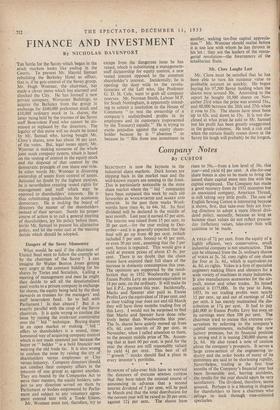FINANCE AND INVESTMENT
By NICHOLAS DAVENPORT THE battle for the Savoy which began in the stock markets looks like ending in the Courts. To prevent Mr. Harold Samuel rebuilding the Berkeley Hotel as offices, that is, if he gets control of the Savoy group, Mr. Hugh Wontner, the chairman, has made a clever move which has alarmed and shocked the City. He has formed a new private company, Worcester Buildings, to acquire the Berkeley from the group in exchange for £640,000 preference stock and £10,000 ordinary stock in Is. shares, the latter being held by the trustees of the Savoy staff Benevolent Fund who cannot be dis- missed or replaced by the directors. The legality of this move will no doubt be tested by Mr. Samuel who, having bought Mr. Clore's shares, now has about 30 per cent. of the votes. But, legal issues apart, Mr. Wontner is making nonsense of the whole joint stock company system, which is based on the vesting of control in the equity stock and the disposal of that control by the democratic principle of one share one vote. In other words Mr. Wontner is divorcing ownership of assets from control of assets. Actuated no doubt by the highest motives, he is nevertheless creating vested rights for management and staff which may be opposed to shareholders' interests. He is thus substituting syndicalism for economic democracy. He is making the board of directors the master of the shareholders instead of their servant. Surely his proper course of action is to call a general meeting of shareholders, lay his policy before them, invite Mr. Samuel to present his alternative policy, and let the votes cast at the meeting dedide which should be adopted.
Dangers of the Savoy Manoeuvre What would be said if the chairman of United Steel were to follow the example set by the chairman of the Savoy ? I can imagine Sir Walter Benton Jones getting very angry at the constant bidding for his shares by Tories and Socialists. Calling a meeting of management and men he might then decide to sell all the denationalised steel works to a private company in exchange for shares, the equity being held by the shop stewards as trustees for the managers' and staff benevolent fund. So to hell with Parliament I Is that absurd ? But it is exactly parallel with the coup of the Savoy chairman. It is quite wrong to confuse the issue by raising the irrelevant controversy over the " bid " technique. Buying shares in an open market or making " bid " offers to shareholders is a sound, time- honoured way of acquiring company control which is not made unsound just because the buyer or " bidder " is a bold financier not wearing the old trade tie. It is also wrong to confuse the issue by raising the cry of shareholders versus employees or City versus industry. Company directors should not conduct their company affairs in the interests of one group as against another. They are. bound by the Companies Act to serve their masters, the equity holders, sub- ject to any direction serVed on them by Parliament or bodies empowered by Parlia- ment and subject to any voluntary agree- ment entered into with a Trade Union.
Mr. Wontner must not, therefore, try to escape from the dangerous issue he has raised, which is substituting a management- staff dictatorship for equity control, a new vested interest opposed to the common shareholder's interest. Incidentally, he is opening the door wide to the revolu- tionaries of the Left who, like Professor G. D. H. Cole, want to grab all company reserves. Mr. Norman Smith, Labour M.P. for South Nottingham, is apparently intend- ing to submit a resolution to the House of Commons " to vest the ownership of a company's undistributed profits in its employees and its customers (represented by the Treasury) equally." He is trying to excite prejudice against the equity share- holder because he is " absentee " or because he " flits from one investment to another, seeking tax-free capital apprecia- tion." Mr. Wontner should realise before it is too late with whom he has thrown in his lot : they are the leaders of the mana- gerial revolution—the forerunners of the totalitarian State.
Mr. Clore Laughs Last Mr. Clore must be satisfied that he has been able to turn his nuisance value to profitable account so quickly. He- began buying his 97,500 Savoy holding when the shares were around 30s. According to the report he bought 10,500 shares on Nov- ember 23rd when the price was around 51s., and 60,000 between the 26th and 27th when it rose to 53s. The shares have since been up to 62s. and down to 53s. It is not dis- closed at what price he sold to Mr. Samuel but his profit has been greatly exaggerated in the gossip columns. He took a risk and when the curtain finally comes down at the Savoy his laugh will probably be the longest.


































 Previous page
Previous page